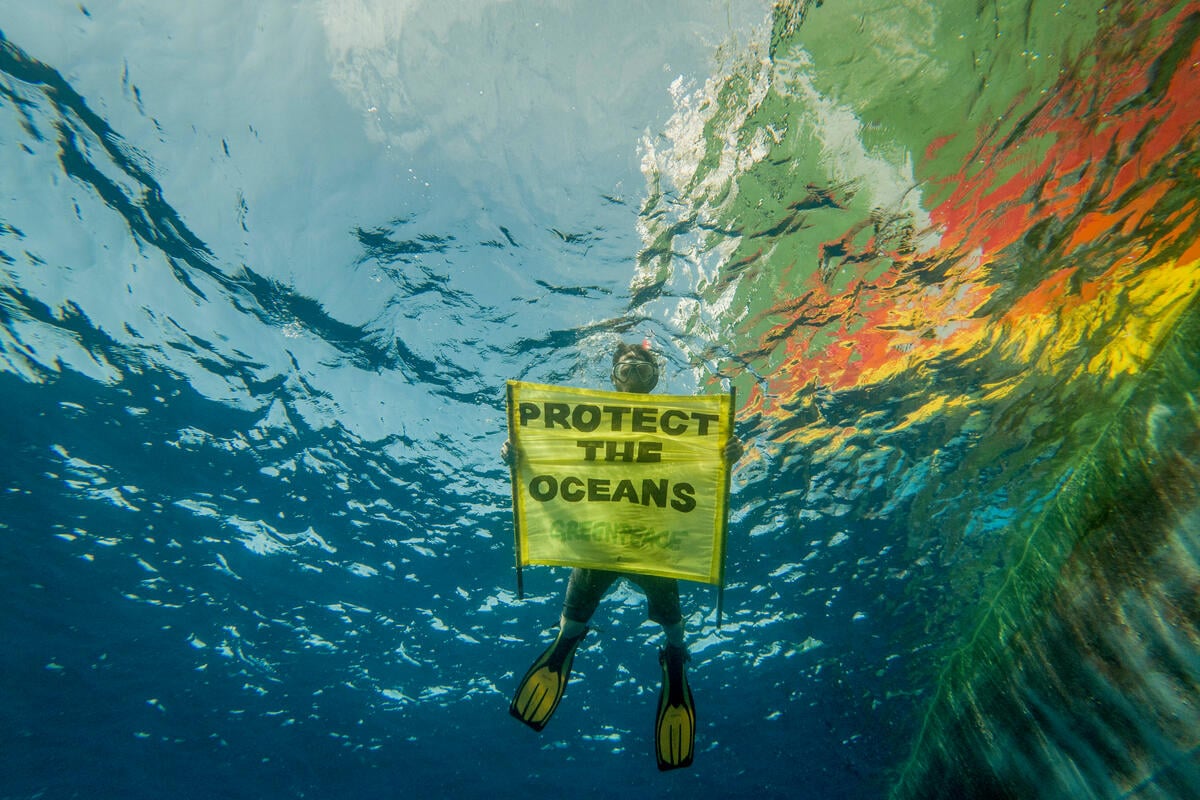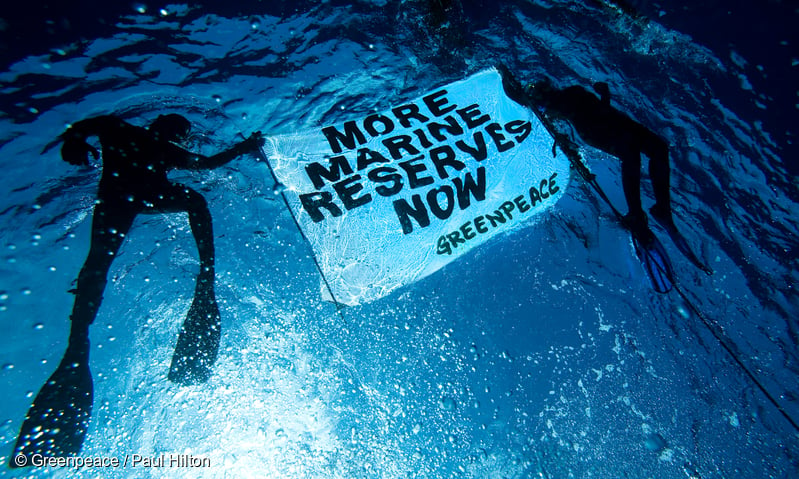
Calls on Governments to Urgently Ratify the Global Ocean Treaty.
Greenpeace investigators’ first-ever full-haul documentation has exposed widespread destructive fishing practices plaguing the North Pacific’s Emperor Seamounts, a unique underwater mountain chain that stretches north from Hawaii.
Honolulu, HI (August 28, 2024)—Greenpeace investigators’ first-ever full-haul documentation has exposed widespread destructive fishing practices plaguing the North Pacific’s Emperor Seamounts, a unique underwater mountain chain that stretches north from Hawaii. This critical biodiversity hotspot is home to tuna, whales, and deep-sea cold-water corals – some of the oldest living species on Earth – and plays a vital role in the cultural heritage and food security of Indigenous Hawaiians and other Pacific communities.
This collaboration is made possible by the global Oceans are Life campaign across the network. The investigation marks the first time Greenpeace has documented complete hauls from longline fishing vessels. The indiscriminate method uses cables up to 100 kilometers long with thousands of hooks, which leads to significant and varied bycatch. Longlines are one of the primary causes of declining global shark populations.
The findings, released at an event on the Greenpeace Rainbow Warrior ship as part of the Huaka’i: One Ocean, One Earth ship tour underway in Hawaii, include:
- 84 sharks, averaging three sharks per hour over 25 hours of documentation, were hauled from the water. The sharks were either dead or quickly killed on board with no apparent consideration of the age of the sharks or if they were endangered species.
- Approximately 4,000 empty hooks were pulled up, demonstrating the significant potential for longlines to contribute to the severe depletion of marine species in the region. Captains shared their disappointment in the size and volume of their catches.
The investigation is part of the Greenpeace network’s global campaign to designate the Emperor Seamounts, a UN Ecologically and Biologically Sensitive Marine Area, as a Marine Protected Area under the recently adopted Global Ocean Treaty. Scientists have said that these marine sanctuaries are needed to protect 30% of the world’s oceans by 2030 to allow biodiversity to recover and thrive.
Solomon “Uncle Sol” Kaho’ohalahalal, cultural ambassador and former statesman who works with the Maui Nui Makai Network to protect and restore coastal ecosystems, speaking at the event presenting the findings, said: “For Indigenous Hawaiians, the ocean is not just a resource; it’s our ancestor, the source of our creation, sustainer, and home. Protecting these waters is not an option—it’s a responsibility. Across the Pacific, we have seen and felt the impact of its destruction and what happens when the ecosystems it sustains are thrown out of balance. In the wake of these sobering findings, our communities must unite in our call for ocean conservation.”
Vessels such as those encountered by Greenpeace usually make several fishing trips yearly. Thousands of these vessels operate in the Pacific and other parts of the high seas –areas beyond national jurisdiction. About 72–76% of globally mapped industrial fishing is not detected by public monitoring systems, which hinders the tracking of Illegal, unreported, and unregulated (IUU) fishing and labor abuses in these hard-to-reach areas.
Charli Fritzner, onboard campaign lead-Greenpeace Beyond Seafood Campaign, who participated in these investigations, said: “We came to the North Pacific to investigate fishing vessels, on their fishing and labor rights practices, and what we found were sharks indiscriminately pulled out of the ocean, often fighting for their lives, amongst seemingly endless empty hooks. This pattern was repeated across all five longline hauls observed and is a worrying indication of the increasing emptiness that destructive fishing practices have caused in our oceans, enabled by woefully inadequate high seas regulation.”
Human Rights and Sustainability in the Seafood Industry
The labor investigation, conducted simultaneously by the network’s Beyond Seafood Campaign, also found that crews of these vessels faced harsh labor conditions – far below the international norms established by the International Labour Organization and the U.N. Guiding Principles on Business and Human Rights (UNGP). While the crew on these vessels reported being at sea for three months, vulnerable migrant fishers – predominantly from Indonesia – often spend months or years aboard the vessels, where they are isolated from their families and labor unions under substandard working conditions and without means of reporting abuse.
The industrial fishing industry is largely driven by the $40 billion global tuna market and the growing popularity of canned tuna. In the U.S., canned tuna is the third most popular seafood item, and its sales are expected to increase. The third edition of Greenpeace USA’s High Cost of Cheap Tuna report, released at the event, indicates that while some U.S. retailers have made progress in sustainably sourcing tuna, most of their human rights and sustainability practices still fail to address these issues.
There is often an overlap between labor rights abuses and illegal, unregulated, and unreported (IUU) fishing activities. Together, these linked issues perpetuate the depletion of tuna stocks, the bycatch of marine life caught on tuna lines, and the suffering of fishers subject to labor abuses on board.
Fritzner continued: “Out on the high seas, far from the public gaze, industrial fishing vessels can pillage the oceans at will, with devastating consequences for marine ecosystems and vulnerable fishers who work on them. The threats facing our oceans are not isolated; they are global and have both human and ecological impacts. To ensure that consumers in the US are not eating seafood tainted with environmental destruction and forced labor, the Biden-Harris Administration must expand the Seafood Import Monitoring Program to include all species and forced labor within IUU. We also call on them to take the steps that science and justice demand and ratify the Global Ocean Treaty in 2025 and protect the Emperor Seamounts as part of a global network of protected areas covering at least 30% of the world’s oceans.”
Greenpeace USA has also called on seafood companies and retailers to adopt more sustainable fishing practices and improve labor conditions for vulnerable workers. During the investigation, with the captains’ permission, the investigative team onboard the Greenpeace Rainbow Warrior engaged with crew aboard Taiwanese-flagged longliners to grant them access to satellite internet, allowing them to contact family and unions for the first time in months.
The Emperor Seamounts, a priority site for Greenpeace network’s global ocean protection efforts under the new Global Ocean Treaty, have historically faced intense fishing pressure from longliners and bottom trawling. The most significant threat to the area is illegal, unreported, and unregulated fishing, particularly by Taiwanese longliners, which comprise a third of the fleet in the Emperor Seamounts.
James Cromwell, actor and activist who opened the event, said: “By working together, drawing on both traditional knowledge and contemporary scientific insights, we can engage in a respectful knowledge exchange that will enrich our communities and strengthen our efforts to protect people and the planet for generations to come.”
The Rainbow Warrior will continue its journey across the Hawaiian Islands, working alongside Indigenous leaders to spotlight their efforts to protect the ocean.
###
Photo & video of the haul documentation and ship interactions available in the Greenpeace Media Library.
Greenpeace USA is part of a global network of independent campaigning organizations that use peaceful protest and creative communication to expose global environmental problems and promote solutions that are essential to a green and peaceful future. Greenpeace USA is committed to transforming the country’s unjust social, environmental, and economic systems from the ground up to address the climate crisis, advance racial justice, and build an economy that puts people first. Learn more at www.greenpeace.org/usa



